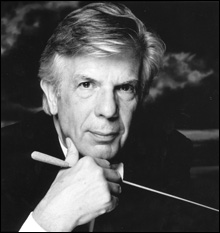Opera Boston’s Lucrezia Borgia , the BSO’s Oedipus Rex
By LLOYD SCHWARTZ | May 9, 2006

EXPLOSIVE OEDIPUS: Christoph von Dohnányi led the season closer.
|
Of the three operas recently competing with one another, Opera Boston’s presentation of Donizetti’s Lucrezia Borgia was in some ways the most fun, an evening of “total theater” — largely unfamiliar but compelling music, expansively and propulsively conducted by Gil Rose and elegantly played; eye-catching and workable sets (Steven Capone capturing the sinister side of Venice and Ferrara) and sexy punk/Renaissance costumes, down to studded codpieces (Nancy Leary); atmospheric chiaroscuro lighting (Christopher Ostrom); skillful, smart staging (Jay Lesenger) keeping the plot in motion and capitalizing on its numerous dramatic confrontations; and singers giving their considerable all. A perfect cast for this challenging example of early-19th-century bel canto is almost inconceivable. So you could go down the line and fault pitch problems or vocal strain or cloudy tone. Yet major opera houses would be hard pressed to find a more convincing ensemble. Almost every cast member was a skillful actor who sang — and moved — stylishly and in character, whether soldier, spy, assassin, or duke. Given the opera’s many duets (something Verdi must have picked up before he composed Rigoletto, another opera in which the central plot concerns a parent trying to protect a concealed offspring), it was thrilling to see characters looking their interlocutors right in the eye, even staring them down.
Mezzo-soprano Christine Abraham (the impressive heroine of Boston Lyric Opera’s post-9/11 production of Tod Machover’s Resurrection) was outstanding in the leather-trouser role of Orsini, the soldier-of-fortune/poet who has the opera’s famous drinking song and is the best friend of Gennaro (tenor Justin Vickers), the secret son of Lucrezia Borgia (so secret he himself doesn’t know). Their rambunctious cohort, all ultimately victims of Lucrezia’s poisonous plot, included Steven Saunders, Christian Figueroa, Tae Suk Sue, and Tom O’Toole. John David Adams and Alan Schneider were vividly opposing spies; William Thorpe was a menacing assassin (another character foreshadowing Rigoletto); and Bert Johnson (Duke of Ferrara, Lucrezia’s fourth husband — a statistic she uses to remind him of just where he stands) made a strong royal adversary, especially when his dark voice came into focus.
In the title role, the exciting young (not yet 30) Quincy soprano Barbara Quintiliani, who just won the prestigious Francisco Viñas competition in Spain, made a complicated impression. She commands the stage. Her enormous and often beautiful voice rides easily over chorus and orchestra. Sometimes it’s ear-popping in its brilliant flexibility, occasionally just effortful. In her third performance within five days, she at first sounded tired and unsteady; several important high notes (like her very last) were shy of true pitch. She threw herself into the role, outsnarling her enemies, banging on a table. She has the openly expressive face and broad responses of a silent-movie heroine — larger than life in a cast of more sophisticated actors, but in a part that’s meant to be larger than life. Some subtlety in Quintiliani’s acting might not only enrich her dramatic capabilities but also help her vocal control. Audiences love her. But if she’s to have an important career, she’ll need more than love.
 Related
Related:
Boston feasts, Cornucopia, Winter harvest, More 
- Boston feasts
The Boston Symphony Orchestra, Celebrity Series, Emmanuel Music, Boston Early Music Festival, and more.
- Cornucopia
The year 2007 didn’t begin on the highest note.
- Winter harvest
"I don’t want to be here,” soprano Susan Larson lamented in her moving eulogy to her old friend and colleague Lorraine Hunt Lieberson.
- Country for old men
A youthful 80-year-old Sir Colin Davis was back in front of the Boston Symphony Orchestra last weekend with one of the pieces he loves most.
- From Knoxville to Swan Lake and back
As our most prestigious classical-music institution, the Boston Symphony Orchestra ought to be every year’s headliner, and once again, under the adventuresome direction of James Levine, it is.
- Amazing weekend
James Levine’s opening salvo for his year-long Beethoven/Schoenberg series with the Boston Symphony Orchestra couldn’t have been more ambitious: the work that opened Symphony Hall in 1900.
- Epic undertaking
The act four sequence of quintet, septet, and love duet is non-stop musical orgasm.
- Let's rock
WGBH radio has ended its 58-year tradition of live Friday-afternoon BSO broadcasts, and it doesn't seem that public outcry is going to change that.
- More than Mozart
One of the spring’s most exciting prospects is the premiere of John Harbison’s But Mary Stood: Sacred Symphonies for Chorus and Instruments.
- Phenomenal!
Living for a century is still a milestone; for a great and still-productive artist to do so is virtually unheard of.
- Here comes the bride
It's been a long time since Bostonians had the chance to see the most popular Czech opera, Bedrich Smetana's The Bartered Bride , but Opera Boston followed its electrifying run of Shostakovich's The Nose with this tuneful folk opera and gave it a sweet and very likable production.
- Less

 Topics
Topics:
Music Features
, Entertainment, Vanessa Redgrave, Peter Sellars, More  , Entertainment, Vanessa Redgrave, Peter Sellars, Sophocles, Nancy Leary, Kaija Saariaho, Christopher Ostrom, Willard White, Eunice Alberts, Jean Cocteau, Less
, Entertainment, Vanessa Redgrave, Peter Sellars, Sophocles, Nancy Leary, Kaija Saariaho, Christopher Ostrom, Willard White, Eunice Alberts, Jean Cocteau, Less 